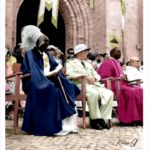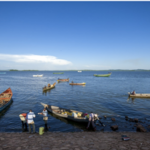The Extension of Royal Power to the North
During the months when the Court was beginning its attacks on clients of the Europeans in central Rwanda, Fathers at the northern mission of Rwaza had been experiencing growing difficulties with their “Bakiga” neighbors (The people of these regions did not always accept the Hutu-Tutsi social parameters of the Court; instead there was a greater shared identity among people in these regions as Bakiga, “the people of the mountains.”). The Bakiga had originally welcomed the Fathers, hoping that the foreigners would ally with them against the Tutsi notables who were trying to extend their control over the area. Rwabugiri had raided this region several times, forcing some of the lineages to submit and pay ikoro prestations to him and his batware. Other lineages, however, had retained their independence: Court notables who ventured onto their hills were fortunate to escape with their lives, to say nothing of the tax revenues. The Fathers recognized that an alliance with the Bakiga against the notables offered the greatest promise of immediate success for the mission. But their superior at Save, Monsignor Hirth, had insisted that they cooperate with the notables even at the risk of alienating the local population. In accord with his instructions they tried working through the local leaders, but the representatives of the Court saw these autonomous authorities as rivals, not supporters, and gave them little help. Nor were the Fathers any more successful. When they tried to get one notable to requisition wood for construction from the Bakiga, he answered their request with “a twisted little tree cut in three pieces.”Despite the evident of the Court notables, the Fathers continued to advocate for the extension of their control over the area, thereby losing the favor of mort local people. Within several months of the missionaries’ arrival, Bakiga were refusing to come to work or to sellfood at the mission. Those who associated with the Fathers were scorned and beaten, sometimes even by the men of their own lineages.
The Bakiga resented the missionaries not just because they were supporting the Court notables but also because they were themselves becoming demanding rulers instead of the babyeyi, or “parents,” that they had originally promised to be. Rwaza had been the one mission founded without the consent of the Court. Having no Rwandan Court authority to grant them land, the Fathers had simply appropriated the property they wanted. Although they paid the original holders of the land, the dispossessed resented being forced to leave the property that had belonged to their lineages for generations. Other Bakiga saw the Fathers’actions as a dangerous precedent that might one day result in the loss of their own holdings. Because the missionaries needed a great many workers for their construction projects, and because the Bakiga refused to present themselves voluntarily to work for salaries, the foreigners obligated the local notables or lineage heads to provide them with eight hundred to a thousand workers per day. The Fathers rewarded those who supplied the laborers and even gave a minimal salary to the conscripted laborers. But the Bakiga felt that the payments hardly compensated for the loss of their autonomy and the obligation to work for the interlopers whom they feared and hated. In relying on forced labor as in appropriating land, the Fathers were following patterns established by Court notables who had moved into other regions. The Bakiga around Rwaza who were aware of these procedures elsewhere but who had not yet submitted to such demands from the Court notables found themselves obliged to endure them from the Europeans.
When faced with resistance to their demands or with attacks on their permanent employees (mostly East Africans), the Fathers and their several dozen armed guards did not hesitate to execute punitive raids. When German troops were in the area, they called upon them as well for help in establishing their version of law and order around Rwaza. In late July 1904 the Fathers launched such a raid in response to cries of distress from several of their workers, who claimed to have been assailedwithout cause while cutting trees in the forest. In fact the incident had developed when the Bakiga tried to resist arbitrary demands by the Fathers’ men for beer and livestock. But in this case, as in many others, the Fathers did not suspect the abuses committed by their workers. Instead they severely punished the Bakiga, killing several and destroying homes and crops.
Coming after several similar incidents in the preceding months, this attack pushed the Bakiga to unite against the foreigners. For two weeksthey alternately laid siege to the mission and defended themselves against the raiding parties sent out by the Fathers. They were encouraged by the rumor of von Grawert’s death, which reached the area of Rwaza at this time. As soon as the Fathers realized the seriousness of the attack, they summoned help from a nearby Belgian post (in the Congo) and from the mission at Nyundo. Aided by the Belgian officer and the two Fathers from Nyundo (who had brought with them a force of two hundred Rwandans), the Rwaza Fathers set out to take vengeance on their assailants. The people in the immediate vicinity of the mission quickly realized that safety and profit lay on the side of the Fathers. Mobs of a thousand and more swelled the ranks of the attacking missionaries and joined in pillaging their less fortunate neighbors. The most valuable booty captured was of course cattle. The Fathers kept some for their own herd and gave others to the Fathers from Nyundo; then, like Rwandan batware back from a military expedition, they distributed the rest to their most valorous followers.
The Fathers, who had not yet been able to establish good relations with the notables, mistakenly attributed the decision to attack the mission to these representatives of the Court. Such was the hostility between the notables and Bakiga that if the notables had proposed an attack, the Bakiga would probably have abstained. The Bakiga even took advantage of the general unrest following the attack to kill several envoys sent by the Court to the area. Once the attack had been launched, however, the notables encouraged the Bakiga to rid the area of the Fathers if they could. While pretending to help, the representatives of the Court did their best to handicap the Fathers in the struggle: the guides whom they provided misled the Fathers’ raiding parties; the warriors who were supposed to be helping in an attack disappeared quietly over the nearest hill. The notables, like those in central Rwanda, harassed messengers traveling between missions. They stripped one unfortunate of his European-style clothes, symbol of his allegiance to the Fathers, and sent him naked on his way.
https://uk.amateka.net/the-extension-of-royal-power-to-the-north/https://uk.amateka.net/wp-content/uploads/2022/11/thecolon.jpghttps://uk.amateka.net/wp-content/uploads/2022/11/thecolon-150x150.jpgHistory of kingsSocial & cultureDuring the months when the Court was beginning its attacks on clients of the Europeans in central Rwanda, Fathers at the northern mission of Rwaza had been experiencing growing difficulties with their 'Bakiga' neighbors (The people of these regions did not always accept the Hutu-Tutsi social parameters of the...BarataBarata rpierre@ikaze.netAdministratorAMATEKA | HISTORY OF RWANDA




